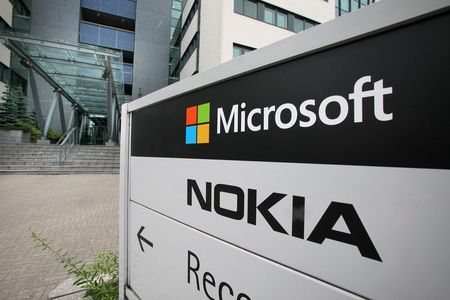By Bill Rigby
SEATTLE (Reuters) - Microsoft Chief Executive Officer Satya Nadella kicked off one of the largest layoffs in tech history on Thursday, hoping to reshape the aging PC industry titan into a nimbler rival to Apple and Google, and jolt a culture at the company that is used to protecting its existing Windows and Office franchises.
Microsoft Corp said on Thursday it will slash up to 18,000 jobs, or 14 percent of its workforce, over the next 12 months as it almost halves the size of its newly acquired Nokia phone business and tries to become a cloud-computing and mobile-friendly software company.
The larger-than-expected cuts are the deepest in the software giant's 39-year history and come five months into Nadella's tenure.
Beyond the Nokia reductions, Nadella gave few clues about where the ax will fall or what areas will receive more funding.
One source briefed on the cuts said a major victim would be the 175-strong Xbox Entertainment Studios unit, which will start to wind down efforts to create original content. But it will continue to work on its highest-profile project, a filmed version of the blockbuster 'Halo' videogame.
Nadella said he will answer questions from employees at a town hall meeting at Microsoft headquarters in Redmond, Washington, on Friday and flesh out his plans publicly after Microsoft's quarterly earnings report on July 22.
"We will simplify the way we work to drive greater accountability, become more agile and move faster," Nadella wrote to employees in a memo made public early Thursday. "We plan to have fewer layers of management, both top down and sideways, to accelerate the flow of information and decision making."
The size of the cuts were welcomed by Wall Street, which was critical of the Nokia acquisition and viewed Microsoft as bloated under previous CEO Steve Ballmer, topping 127,000 in staff after absorbing Nokia earlier this year.
"This is about double what the Street was expecting," said Daniel Ives, an analyst at FBR Capital Markets. "Nadella is clearing the decks for the new fiscal year. He is cleaning up part of the mess that Ballmer left."
Microsoft shares rose 1.8 percent to $44.88 on Nasdaq, reaching their highest since the technology stock boom of 2000.
About 12,500 of the layoffs will come from eliminating overlaps with the Nokia unit, which Microsoft acquired in April for $7.2 billion (4.20 billion pounds), with the bulk of the cuts coming from Nokia itself. The acquisition of Nokia's handset business in April added 25,000 people to Microsoft's payroll.
The Nokia-related cuts were widely expected. When it struck the deal, Microsoft said it would cut $600 million per year in costs within 18 months of closing the acquisition.
Excluding the Nokia cuts, the remaining 5,500 layoffs were not as shocking as it first appeared, said Sid Parakh, an analyst at McAdams Wright Ragen.
"The aggregate number is still bigger than expected but it's not as big as it comes across," he said. "There's going to be a lot of re-hiring in other areas of the business. On a net basis, the numbers are small."
Microsoft's campus appears to have escaped heavy cuts, at least for now. The first wave of layoffs include 1,351 jobs in the Seattle region, Microsoft said.
About 1,100 jobs will be cut from Nokia's original home country of Finland, according to government and union representatives there, with about half coming from the closure of its research and development operation in the northern city of Oulu.
Stephen Elop, the former CEO of Nokia who now runs Microsoft's devices unit, said phone engineering efforts will now be concentrated in Salo and Tampere, Finland, and it will reduce engineering work in Beijing and San Diego.
He said phone manufacturing will be focused in Hanoi, Vietnam, with some production to continue in Beijing and Dongguan, China. Some Microsoft manufacturing and repair operations will be moved to Manaus, Brazil and Reynosa, Mexico, as it winds down operations in Komaron, Hungary.
The EU's employment commissioner said he has asked to meet with Microsoft to discuss the social impact of the layoffs.
As part of the integration of Nokia, Microsoft is abandoning its experiment in making phones powered by Google's Android system, moving some of its Nokia X line of phones onto Windows phone software.
The company said it expects to take pretax charges of $1.1 billion to $1.6 billion over the next four quarters to account for the costs of the layoffs.
Nadella's cuts are the biggest at the Redmond, Washington-based company since Ballmer axed 5,800, or about 6 percent of headcount, in the depths of the recession in early 2009.
The new CEO's moves are designed to help Microsoft shift from being a primarily software-focused company to one that sells online services, apps and devices it hopes will make people and businesses more productive. Nadella needs to make Microsoft a stronger competitor to Google and Apple Inc, which have dominated the new era of mobile-centric computing.
Marking this change of emphasis, Nadella last week rebranded Microsoft as "the productivity and platform company for the mobile-first and cloud-first world."
Microsoft is not alone among the pioneers of the personal computer revolution now slimming down to adapt to the Web-focused world.
PC-maker Hewlett-Packard Co is in the midst of a radical three-to-five-year plan that will lop up to 50,000 from its staff of 250,000.
International Business Machines Corp is undergoing a "workforce rebalancing," which analysts say could mean 13,000, or about 3 percent of its staff, being laid off or transferred to new owners as units are sold.

Chipmaker Intel Corp and network equipment maker Cisco Systems Inc both said in the past year they were cutting about 5 percent of their staff.
(Additional reporting by Ron Grover and Lisa Richwine in Los Angeles and Jussi Rosendahl and Sakari Suoninen in Helsinki; Editing by Edwin Chan, Mohammad Zargham, Jeffrey Benkoe and Bernard Orr)
